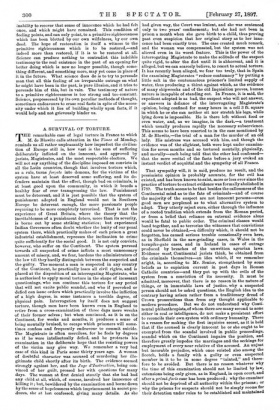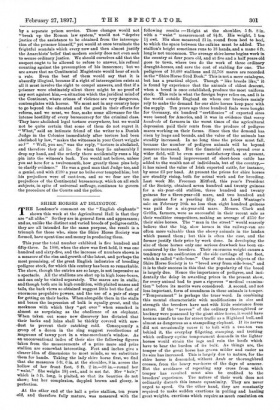A SURVIVAL OF TORTURE.
THE remarkable case of legal torture in France to which M. de Blowitz calls attention in the Times of Monday, reminds us all rather unpleasantly how imperfect the civilisa- tion of Europe still is, how vast is the sum of suffering deliberately inflicted on the innocent, and approved by jurists, Magistrates, and the most respectable electors. We will not say anything of the discipline imposed on convicts in all the Latin countries, though that involves torture which, as a rule, turns forfats into demons, for the victims of the system have at least deserved some suffering, and its de- fenders maintain that the effect, though bad on criminals, is at least good upon the community, in which it breeds a healthy fear of ever transgressing the law. Punishment must be deterrent, and it is just possible that the system of punishment adopted in England would not in Southern Europe be deterrent enough, the more passionate people requiring to be more completely terrorised. That is not the experience of Great Britain, where the theory that the inevitableness of a punishment deters, more than its severity, is borne out by some striking statistics ; but experienced Indian Governors often doubt whether the lenity of our penal system there, which practically makes of each prison a great industrial establishment, represses the inclination to crime quite sufficiently for the social good. It is not only convicts, however, who suffer on the Continent. The system pursued towards all suspected of crime inflicts a most unnecessary amount of misery, and, we fear, hardens the administrators of the law till they hardly distinguish between the suspected and the guilty. The moment a man is suspected in any country of the Continent, he practically loses all civil rights, and is placed at the disposition of an interrogating Magistrate, who is authorised to apply moral torture in the shape of incessant questionings, who can continue this torture for any period that will not excite public scandal, and who if provoked or defied can issue orders which practically involve the infliction of a high degree, in some instances a terrible degree, of physical pain. Interrogation by itself does not suggest torture, though men have been known even in England to retire from a cross-examination of three days mere wrecks of their former selves ; but when continued, as it is on the Continent, for weeks and months, it produces a sense of being mentally bruised, to escape which prisoners will some- times confess and frequently endeavour to commit suicide. The Magistrate is often merciless, for he feels by degrees as if he were intellectually defied, and he protracts his examination in the deliberate hope that the resisting powers of the victim may give way. We remember a very bad case of this kind in Paris some thirty years ago. A woman of doubtful character was accused of murdering her ille- gitimate child shortly after its birth. The evidence seemed strongly against her, and the Jugs d'Instruction, being con- vinced of her guilt, pressed her with questions for many days. The woman at first denied stonily that she had had any child at all, which, of course, involved her innocence of killing it ; but, bewildered by the examination and borne down by the sense of hopelessness which imprisonment in secret pro- duces, she at last confessed, giving many details. As she
had given way, the Court was lenient, and she was sentenced only to two years' confinement; but she had not been in prison a month when she gave birth to a child, thus proving past even suspicion that her original story as to her inno- cence had been exactly true. The case created much remark, and the woman was compensated, but the system was not altered even in its worst feature. This is the power of the interrogating Magistrate to make the solitude of the suspect quite rigid, to alter the diet until it is abhorrent, and it is alleged, but we can scarcely believe, to resort to actual torture. It has recently been alleged, we fear too truly, that in Spain the examining Magistrates "reduce contumacy" by patting a little salt in the contumacious prisoner's limited supply of water, thus producing a thirst against which, as the evidence of many shipwrecks and of the old Inquisition proves, human nature is incapable of standing out. In France, it is said, the expedient adopted is as bad, the suspect who will not answer, or answers in defiance of the interrogating Magistrate's opinion, being confined for many hours in a cell 3 ft. square in which he or she can neither sit nor stretch his legs, while lying down is impossible. He is there left without food or even water, and, as we imagine, in the dark,—a treatment which usually produces rapidly the necessary subservience. This seems to have been resorted to in the case mentioned by M. de Blowitz,—the trial of a man for the murder of an old lady. His mistress was accused with him, and though the evidence was of the slightest, both were kept under examina- tion for seven months and so tortured mentally, physically, and morally—each being told that the other had confessed— that the mere recital of the facts before a jury evoked an instant verdict of acquittal and the sympathy of all France.
That sympathy will, it is said, produce no result, and the pessimistic opinion is probably accurate, for the evil has existed, and has been known to exist, more or less ever since the practice of torture to extract evidence was formally abolished in 1789. The truth seems to be that besides the callousness of the Continental mind as to the fate of criminals—and of course the majority of the suspect are not innocent persons—even good men are perplexed as to what alternative system to adopt. They utterly reject ours, either through the influence of a rooted tradition which extends from the Roman period, or from a belief that reliance on external evidence alone would be fatal to public order. The criminal classes would band together, and so terrorise the witnesses that convictions could never be obtained,—a difficulty which, it should not be forgotten, has caused serious trouble occasionally even here, as in Sheffield in the saw-grinding cases, in Wales in the turnpike-gate cases, and in Ireland in cases of outrage produced by breaches of the unwritten agrarian laws. Evidence must, Continental jurists think, be obtained from the criminals themselves—an idea which, if we remember aright, is, according to Mr. Senior, strengthened by some beliefs as to expiation current in past days in Roman Catholic countries—and they put up with the evils of the system from a conviction of its necessity. It must be admitted, moreover, that there is no reason in the nature of things, or in immutable laws of justice, why a suspected person should not be asked questions, the English idea to the contrary having arisen rather from a traditionary dread of Crown prosecutions than from any thought applicable to modern procedure. But we do not understand why Conti- nental philanthropists,of whom there are many second to none either in zeal or intelligence, do not make a persistent effort to reconcile their own system with ordinary humanity. There is a reason for making the first inquiries secret, as it is held that if the accused is clearly innocent he or she ought to be exempted from the scandal involved in public proceedings, scandal which on the Continent impairs the position, and therefore greatly impedes the marriages and the seekings for employment of every near relative of the accused. An unjust but incurable prejudice, which once existed also among the Scotch, holds a family with a guilty or even suspected member in it to be in some degree " tainted," and there- fore to be avoided. But there is no reason whatever why the time of this examination should not be limited by law, extensions being only given, as in England, in open court, and after a prima facie case has been produced ; why the examiner should not be deprived of all authority within the prisons ; or why the prisons for suspects should not be simply rooms for their detention under rules to be established and maintained
by a separate prison service. Those changes would not 4' break up the Roman law system," would not "deprive justice of the assistance to be obtained from the interroga- tion of the prisoner himself," yet would at once terminate the frightful scandals which every now and then almost justify the Anarchists' belief that modern society does not even seek to secure ordinary justice. We should ourselves add that the suspect ought to be allowed to refuse to answer, his refusal counting against the presumption of his innocence; but we are aware that no Continental Magistrate would hear of such a rule. Even the best of them would say that it is absurdly illogical, because if a right of interrogation exists at all it must involve the right to compel answers, and that if a, -prisoner were obstinately silent there might be no proof of any sort against him,—a situation which the juridical mind of the Continent, where crimes of violence are very dangerous, contemplates with horror. We must not in any country hope to go beyond the educated and the good in their efforts for reform, and we must, we fear, make some allowance for the intense hostility of every bureaucracy for the criminal class. 'They have abolished legal torture everywhere, but we would not be quite certain that some of them do not regret it, "What," said an intimate friend of the writer to a Danish Judge in the Colonies immediately after torture had been abolished by law, " makes the witnesses in your Court wriggle so P " " Well, you see," was the reply, " torture is abolished, and therefore they all lie. So when they lie unbearably I drop my hand, and the orderly there accidentally runs a big ,pin into the witness's back. You would not believe, unless you sat here for a twelvemonth, how greatly those pins help to clarify evidence." He was a good man that Judge too, and a genial, and with £180 a year no bribe ever tempted him; but his prejudices were of cast-iron, and so we fear are the prejudices of the Continental bureaucracy, which on all such subjects, in spite of universal suffrage, continues to govern the procedure of the Courts and the police.



































 Previous page
Previous page